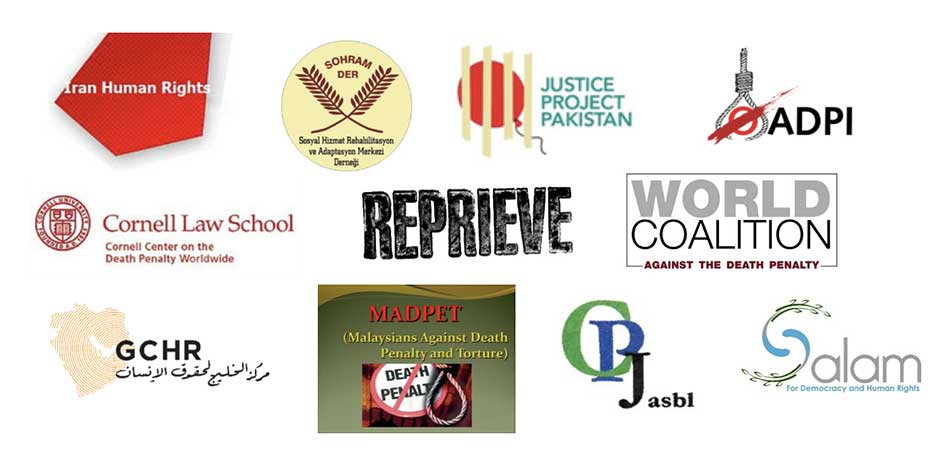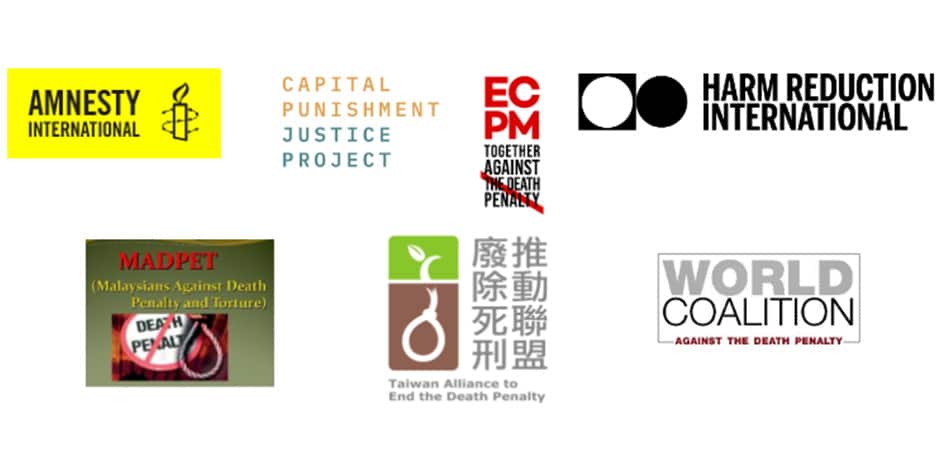
Violations of the Right to Life in the Context of Drug Policies
Statement
By International Harm Reduction Association (IHRA), Corporación ATS Acción Técnica Social, IDPC Consortium, Washington Office on Latin America, non-governmental organizations in special consultative status, Anti-Death Penalty Asia Network (ADPAN); Capital Punishment Justice Project (CPJP); Centre on Drug Policy Evaluation (CDPE); Cornell Centre on the Death Penalty Worldwide; Eleos Justice - Monash University; Instituto RIA, AC; Iran Human Rights (IHR); World Coalition Against the Death Penalty., NGO(s) without consultative status, also share the views expressed in this statement, on 10 August 2021
Harm Reduction International and co-signatories congratulate Mr Tidball-Binz on his appointment as Special Rapporteur on summary executions. With this statement, we highlight key violations of the right to life enabled by repressive drug policies or reported in the context of drug law enforcement; and encourage this Rapporteur to pay specific attention to the impact of drug control on the right to life in future activities.
Death Penalty for drug offenses
Death remains a possible punishment for drug offences in at least 35 countries. Between 2008-2020, over 4,500 people were executed for drug offences globally; while at least 3,000 people remain on death row.
Because of the systemic lack of transparency surrounding the imposition of death penalty – in itself inconsistent with human rights standards(2), these figures represent an underestimation of the phenomenon.(3)
In 2020, a significant drop in known executions was recorded, mainly due to an unofficial moratorium on drug-related executions in Saudi Arabia. Of 30 confirmed executions for drug offences, 25 were carried out in Iran.(4) 30 drug-related executions were reported in Iran between January-May 2021 alone.(5)
Death sentences and executions for drug offences are arbitrary on several levels. Among others:
1) They are committed on prohibited grounds: drug offences do not meet the definition of ‘most serious crimes’ to which ICCPR mandates the death penalty be restricted, in retentionist countries;
2) In at least 12 countries, death is the mandatory punishment for certain drug offences, preventing courts from considering all circumstances of the offence/offender, including mitigating factors, instances of human trafficking, and whether the defendant belongs to a protected group(6);
3) Executions often follow trials lacking basic legal safeguards. Fair trial violations in capital drug cases are well-documented, including: forced confessions; reversal of the presumption of innocence; denial of legal assistance; lack of interpretation and consular assistance to foreign nationals; failure to adequately consider requests for clemency.(7) A particularly problematic trend witnessed since the COVID-19 outbreak is the imposition of death sentences following hearings held virtually, absent essential fair trial guarantees.(8)
4) Individuals sentenced to death often suffer violations of their right to be free from torture and ill-treatment, in the form of: torture prior to/during/after trial; failure to receive timely notification of the execution date; public executions. Human rights mechanisms concluded that “failure to respect Article 7 would inevitably render the execution arbitrary in nature”;(9)
5) Death sentences for drugs are often imposed in a discriminatory manner, disproportionately impacting the poorest and most marginalised in society(10) and within the drug market. In addition, the overrepresentation of foreign nationals has been linked to prejudice and ethnic discrimination.(11)
Reintroduction/expansion of the death penalty for drug offences.
Art.6 ICCPR prohibits abolitionist countries from reintroducing the death penalty and from expanding it to new offences/offenders. Nevertheless, a pattern has emerged of reinstatement or expansion of the death penalty for drug offences; in the form of:
a) Ending of moratoria on executions, such as in the case of Indonesia in 2015(12) and Sri Lanka, whose authorities recently expressed their intention to resume executions against individuals sentenced to death for drug trafficking.(13)
b) (Re-)introducing the death penalty. Reintroduction of capital punishment for drug offences is discussed in the Philippines and included in a bill recently approved in the lower house of Parliament.(14) This development is particularly problematic against the backdrop of the ongoing anti-drug campaign and the systematic human rights violations reported;(15) as well as the fact that the Philippines ratified the Second Optional Protocol to ICCPR (OPII). (Re-)introduction of capital punishment in a country party to OPII would be unprecedented; and represent a critical test to the system of international human rights law. Further, reinstatement of the death penalty in the country should be denounced as impinging technical cooperation of OHCHR with the Philippines as outlined in HRC Resolution 45/33 and ensuing initiatives.(16)
c) Expansion to new offences. For example, Bangladesh expanded the application of capital punishment to the manufacture/distribution of methamphetamine in late 2018.
In 2014 this Rapporteur discussed instances of resumption related to political developments, concluding:
“Executions may be considered arbitrary if they are resumed owing to extraneous developments, unrelated to the crime or criminal. […]. The execution of that convict in order to demonstrate strength in the criminal justice system is arbitrary.”(17)
Arbitrary deprivation of life
Extrajudicial executions are absolutely prohibited under international law. Worryingly, thousands of suspected extrajudicial killings committed in the context of repressive anti-drug campaigns are reported globally. Among others, we highlight the situations in the Philippines,(18) Brazil(19), Bangladesh(20), Mexico(21), and the USA(22). In these countries, hundreds if not thousands of individuals suspected of engaging in the drug market are arbitrarily deprived of life, with perpetrators almost invariably enjoying absolute impunity. Individuals living in poverty, or belonging to racially discriminated communities, are disproportionately impacted(23).
In considering extrajudicial killings, we emphasise:
1) The failure to investigate, prosecute, and hold perpetrators accountable(24); and
2) The plight of secondary victims. This was denounced by this Special Rapporteur in 2014 in the context of the war on drugs in the Philippines:
“As the majority of the victims are men, their female partners, by virtue too of their gender-based roles, are left to confront the associated stigma, fear, insecurity and economic deprivation, in addition to the burdens of identifying and burying their dead loved ones and seeking justice.”(25)
Positive obligations
General Comment no.36 of the Human Rights Committee spells out States’ positive obligations to protect life. Three aspects are particularly relevant to drug policies:
a) Duty to take measures to protect the lives of individuals deprived of liberty – including in prisons and drug detention and rehabilitation centres.
According to Harm Reduction International, opioid agonist therapy and needle and syringe programmes – lifesaving harm reduction services – are only available in prisons in 59 and 10 countries respectively. Meanwhile, public and private drug treatment centres (which governments have an obligation to regulate and monitor) continue operating in many countries, with 500,000 people estimated to be arbitrarily detained in compulsory drug detention facilities in Asia alone.(26) Many of these centres impose non-evidence-based ‘treatment’, including humiliation, physical and psychological violence, and forced labour, in several cases resulting in deaths.(27)
b) Duty to “take appropriate measures to address the general conditions in society that may give rise to direct threats to life or prevent individuals from enjoying their right to life with dignity, [including] prevalence of life-threatening diseases, such as AIDS, tuberculosis.”(28) Among such conditions are the criminalisation of drug use and possession for personal use, lack/criminalisation of harm reduction services, obstacles to accessing health services, housing, and employment for people who use drugs, stigma, discrimination.
c) Duty to take measures to avoid “foreseeable and preventable life-terminating harm or injury.”(29) This should be read as including overdose-related deaths, which are the leading cause of drug-related death and are broadly preventable through a comprehensive set of measures, including decriminalisation of drug use and possession for personal use, community distribution of naloxone, and harm reduction services.(30)
Recommendations
In light of the above, we respectfully ask the Special Rapporteur to:
- Continue denouncing violations committed or enabled in the context of drug control; and calling for a human-rights, health-based approach to drugs. The 47th Session of the Council is an important opportunity for highlighting the negative impacts of repressive drug policy on the right to life, particularly in light of the study on drug policies that will be presented by the WGAD(31); and the ID on the High Commissioner report on systemic racism(32);
- Promote an inclusive interpretation of the right to life which encompasses positive obligations to avoid preventable deaths, and promote the enjoyment of a life with dignity – in line with General Comment 36; and
- Produce a report on the spectrum of violations of the right to life committed in the context of drug control; also reflecting on States’ responsibilities related to the enjoyment of life in dignity, and the obligation to protect the life of individuals under their direct control – particularly in detention settings and in drug treatment centres.






